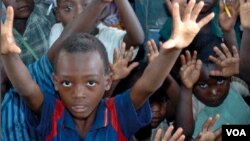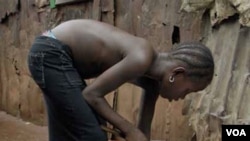A humanitarian group has warned that children living in African cities are at increasing risk of exploitation, abuse and disease. Save the Children says most of the continent’s children eventually will live in urban areas.
A new report said right now about 200 million children live in African urban areas, and the numbers are steadily rising. Save the Children said that “social and development policies are ignoring the reality” that more children are living in slums with “devastating impacts.” The report said sub-Saharan African cities have the highest degree of urban poverty and prevalence of slum populations in the world.
Voices from Urban Africa: The impact of urban growth on children is based on research in Ethiopia, Malawi, Mali, South Africa and Zambia.
“It’s the voices of children in communities. Because we talked to over a thousand children and their families and community members about what are they experiencing? And to me that makes it really urgent when you hear what some of the things that children said to us in this report. I mean one little boy: “When my father cannot find a job to do, he fails to buy food and we stay hungry at home.” On and on. The report is very rich in the voices of children, and it’s something that we need to take seriously,” said Carol Miller, Save the Children’s deputy area director for programs for Africa.
According to the report, “More than half the world’s population now lives in cities, and each year the number of urban residents increases by nearly 60-million.” It added that by 2050, two-thirds will live in urban areas. In Africa, about one billion people are expected to live in urban areas by 2040.
Miller said, “Africa’s youth population is the fastest growing – ages 15 to 24 – in the world. So the growth rate in secondary cities caused us to pause to think, all right, what are we doing, and what do we need to know to really impact the lives of children?”
The report said many governments “underreport the size of urban populations, especially in slums and informal settlements.”
Miller said there are four priorities that must be addressed to ensure the health and safety of children in urban settings: health and nutrition; livelihoods; education and child protection.
“As we talk to local NGOs, non-governmental organizations across Africa, this issue of unaccompanied children, children on the streets – talking about buses pulling in to Addis Ababa and there are actually people watching to see if a boy or girl is unaccompanied, and then preying on them for sexual purposes, or others. There is a household in Malawi – one that we interviewed – with four children out of school, no adult in the household – relying on an uncle to give them some money now and then – out in the streets begging,” she said.
Urban settings often lack the community protection that exists in rural areas.
“In a rural setting you’re likely to have a grandparent or an auntie or an uncle. People in your community know you. You move to an urban setting and that disappears,” Miller said.
The report says poor children are often not in school because they face many barriers such as fees, disabilities, lack of food, bullying and sexual harassment. Their health is put at risk, it says, from a lack of clean water and sanitation, poor nutrition and a lack of access to health care due to cost, travel, waiting times or other reasons.
Miller said, “When you have young people moving into urban settings and needing access to reproductive health, for example, and some clinics say, no, we’re not going to provide family planning to this young girl. So what choices does she have?”
Youth unemployment is also a major problem in African cities. Miller said high youth unemployment was a factor in the uprisings during the Arab Spring.
Among its recommendations, Save the Children called for holistic child protection systems like those in developed countries; enhanced hygiene and sanitation awareness and practices; trained community health workers; linking youth skills training to the awarding of grants and loans; better access for the disabled; and quality control, standards and training to support early child care development.
A new report said right now about 200 million children live in African urban areas, and the numbers are steadily rising. Save the Children said that “social and development policies are ignoring the reality” that more children are living in slums with “devastating impacts.” The report said sub-Saharan African cities have the highest degree of urban poverty and prevalence of slum populations in the world.
Voices from Urban Africa: The impact of urban growth on children is based on research in Ethiopia, Malawi, Mali, South Africa and Zambia.
“It’s the voices of children in communities. Because we talked to over a thousand children and their families and community members about what are they experiencing? And to me that makes it really urgent when you hear what some of the things that children said to us in this report. I mean one little boy: “When my father cannot find a job to do, he fails to buy food and we stay hungry at home.” On and on. The report is very rich in the voices of children, and it’s something that we need to take seriously,” said Carol Miller, Save the Children’s deputy area director for programs for Africa.
According to the report, “More than half the world’s population now lives in cities, and each year the number of urban residents increases by nearly 60-million.” It added that by 2050, two-thirds will live in urban areas. In Africa, about one billion people are expected to live in urban areas by 2040.
Miller said, “Africa’s youth population is the fastest growing – ages 15 to 24 – in the world. So the growth rate in secondary cities caused us to pause to think, all right, what are we doing, and what do we need to know to really impact the lives of children?”
The report said many governments “underreport the size of urban populations, especially in slums and informal settlements.”
Miller said there are four priorities that must be addressed to ensure the health and safety of children in urban settings: health and nutrition; livelihoods; education and child protection.
“As we talk to local NGOs, non-governmental organizations across Africa, this issue of unaccompanied children, children on the streets – talking about buses pulling in to Addis Ababa and there are actually people watching to see if a boy or girl is unaccompanied, and then preying on them for sexual purposes, or others. There is a household in Malawi – one that we interviewed – with four children out of school, no adult in the household – relying on an uncle to give them some money now and then – out in the streets begging,” she said.
Urban settings often lack the community protection that exists in rural areas.
“In a rural setting you’re likely to have a grandparent or an auntie or an uncle. People in your community know you. You move to an urban setting and that disappears,” Miller said.
The report says poor children are often not in school because they face many barriers such as fees, disabilities, lack of food, bullying and sexual harassment. Their health is put at risk, it says, from a lack of clean water and sanitation, poor nutrition and a lack of access to health care due to cost, travel, waiting times or other reasons.
Miller said, “When you have young people moving into urban settings and needing access to reproductive health, for example, and some clinics say, no, we’re not going to provide family planning to this young girl. So what choices does she have?”
Youth unemployment is also a major problem in African cities. Miller said high youth unemployment was a factor in the uprisings during the Arab Spring.
Among its recommendations, Save the Children called for holistic child protection systems like those in developed countries; enhanced hygiene and sanitation awareness and practices; trained community health workers; linking youth skills training to the awarding of grants and loans; better access for the disabled; and quality control, standards and training to support early child care development.











